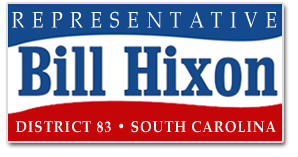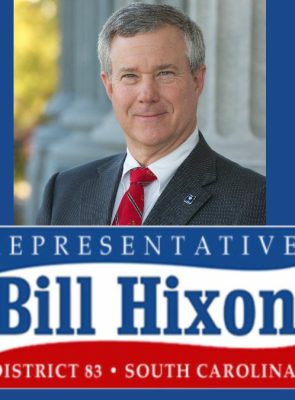Dear Friends,
This is my first newsletter of our 2018 session, we have many bills to review and hear in the next few months.The Senate and the House of Representatives will meet each Tuesday, Wednesday, and Thursday between now to mid May. I hope that you find this update helpful and informative. If I can help you with an issue, please let me know. Thank you for the opportunity to serve you in the SouthCarolina State House.
SCE&G & V.C. Summer Nuclear Issues
V.C. Summer Nuclear Project: The issues surrounding this project related to SCE&G, Santee Cooper, and state regulators are at the forefront facing the General Assembly. Many constituents have contacted me with concerns as to electricity rates and the nuclear project abandonment, questions about the future of SCE&G and Santee Cooper, disdain for SCE&G’s leadership, and a variety of other matters related to this topic. Dominion Energy’s CEO appeared before both Senate and House committees last week. I expect a lot to develop over the coming weeks with legislative and administrative hearings and legislative debate and will do my best to provide up to date information through this forum and in response to constituent inquiries.
HOUSE WEEK IN REVIEW
The House of Representatives took up two of the bills that draw upon the work of the special House Utility Ratepayer Protection Committee which was appointed by the Speaker of the House following the announcement from Santee Cooper and SCANA’s South Carolina Electric and Gas that construction on the V.C. Summer nuclear reactors in Fairfield County was being abandoned after billions of dollars in fees had been collected from South Carolina’s ratepayers under the Baseload Review Act to support the failed nuclear power project.
Ratepayer Protection

In a nearly unanimous vote the S.C. House passed a bill repealing the Base Load Review Act and ending payments by SCE&G customers in paying for the abandoned V.C. Summer nuclear project. The Ratepayer Protection Bill (H.4375) that I cosponsor drops the 18% nuclear surcharge on SCE&G customers’ bills to 0% while giving direction to the Public Service Commission to keep rates as low as possible while the SCANA merger is evaluated. It also repeals the Base Load Review Act and guarantees that no future projects can recover costs under the law abused by SCE&G.
Provisions Included in the Ratepayer Protection Bill:
- Repeals the Base Load Review Act
- Defines the terms “prudent” and “imprudent”
- Removes the nuclear premium and drops the rate from over 18% to 0%
- Authorizes the PSC to set an interim rate
- Suspends automatic stay
 House Speaker Jay Lucas Said, ” Since last August, the House had worked diligently to develop aresponsible plan forward that protects ratepayers and prevents them from paying for a failed nuclear project. Our members followed through with our commitment to halt SCE&G from recouping more of its customers’ hard-earned dollars for the failed VC Summer nuclear project. Setting the nuclear premium rate to zero percent provides South Carolina ratepayers with immediate relief while private sector business negotiations continue before the Public Service Commission. As this innovative approach works its way through the legislative process, I am hopeful the senate will act quickly in an effort to protect ratepayers from corporate greed.”
House Speaker Jay Lucas Said, ” Since last August, the House had worked diligently to develop aresponsible plan forward that protects ratepayers and prevents them from paying for a failed nuclear project. Our members followed through with our commitment to halt SCE&G from recouping more of its customers’ hard-earned dollars for the failed VC Summer nuclear project. Setting the nuclear premium rate to zero percent provides South Carolina ratepayers with immediate relief while private sector business negotiations continue before the Public Service Commission. As this innovative approach works its way through the legislative process, I am hopeful the senate will act quickly in an effort to protect ratepayers from corporate greed.”
The House amended, approved, and sent the Senate (H.4379), a bill creating a
UTILITIES CONSUMER ADVOCATE within the Attorney General’s Office to safeguard the interests of consumers in dealings with public utilities that offer such essential services as electrical power, gas pipelines for heating and cooking needs, water, sewerage, and telecommunications. The new Utilities Consumer Advocate must be an attorney qualified to practice in all the state’s courts who is to be appointed by the Attorney General to serve at the pleasure of the A.G. The legislation includes provisions to prevent conflicts interests, including prohibitions on gifts and campaign contributions from public utilities. The Utilities Consumer Advocate is charged with representing the public utility interests of consumers which includes providing legal representation of the consumer interests before state and federal regulatory agencies. Along with the Public Service Commission’s Office of Regulatory Staff, the consumer advocate is charged with monitoring existing regulations, rate structures, and policies of those agencies of special interest to utility consumers and report to the public through the news media proposed changes under consideration and the effect of those changes on the lives of the citizens of the state. The consumer advocate is authorized to initiate, continue, or intervene in legal proceedings on behalf of the public at large. The consumer advocate must make an annual report to the General Assembly on the year’s activities on behalf of the interests of utility consumers. The legislation includes provisions to afford the consumer advocate access to records of the Office of Regulatory Staff and other state agencies. The Public Service Commission’s Office of Regulatory Staff is directed to make use of its subpoena powers at the consumer advocate’s request. A misdemeanor criminal penalty is established for failure to provide information requested. The financial integrity of public utilities is eliminated as a concern for the Office of Regulatory Staff.
The House amended, approved, and sent the Senate H.4378, a bill that replaces the Public Utilities Review Committee with a new twelve-member UTILITY OVERSIGHT COMMITTEE composed of six legislators holding key leadership positions, two members of the general public appointed by legislative leaders, and four members of the general public appointed by the Governor. The legislation establishes qualifications and duties for committee members. The oversight committee is charged with screening Public Service Commission candidates and making nominations for the election of commissioners by the General Assembly, nominating a qualified candidate for the Governor to consider appointing as the Executive Director of the Office of Regulatory Staff, and reviewing candidates for appointment to the South Carolina Public Service Authority Board of Directors as submitted by the Governor to determine whether they meet the qualifications. The annual budget proposals of the Office of Regulatory Staff and the Public Service Commission must be reviewed and approved by the oversight committee and the salary of the Executive Director of the Office of Regulatory Staff is set by the oversight committee. The oversight committee is required to make annual performance reviews of the Public Service Commission, the individual commissioners, the commission’s Office of Regulatory Staff, and the ORS Executive Director. The oversight committee must develop and distribute to those appearing before the PSC an anonymous and confidential survey to evaluate the commissioners on such matters as their temperament, knowledge, and whether they appear to be influenced by political considerations or the parties who appear before them. The oversight committee is authorized to evaluate the actions of the Public Service Commission so that the members of the General Assembly may better judge whether these actions serve the best interests of the citizens of South Carolina, both individual and corporate. The oversight committee must conduct an annual review of the State Energy Office’s action plan. The oversight committee is authorized to conduct other studies and make other pertinent reports and recommendations to the General Assembly. The legislation includes provisions to prevent conflicts interests for those serving as committee members.
Road Way Trash
 The House this week passed legislation that I cosponsor that should increase enforcement of SC’s littering laws by reducing the fine against it. The legislation came from law enforcement because they believe the state’s current fine structure is so high that some officers are hesitant to enforce it. The bill (H.4458), which passed 100-4, creates a fee structure that is based on the amount of litter involved. For instance, tossed litter under 15 pounds could lead to a $25-100 fine. Litter up to 500 pounds could lead to $200-$500 fines or up to 30 days in jail. The sentence would increase after a second violation. More than 500 pounds of litter could spark a $1,000 fine or 90 days in jail. The bill also lets judges sentence violators to community service – picking up litter. The measure was sent to the Senate.
The House this week passed legislation that I cosponsor that should increase enforcement of SC’s littering laws by reducing the fine against it. The legislation came from law enforcement because they believe the state’s current fine structure is so high that some officers are hesitant to enforce it. The bill (H.4458), which passed 100-4, creates a fee structure that is based on the amount of litter involved. For instance, tossed litter under 15 pounds could lead to a $25-100 fine. Litter up to 500 pounds could lead to $200-$500 fines or up to 30 days in jail. The sentence would increase after a second violation. More than 500 pounds of litter could spark a $1,000 fine or 90 days in jail. The bill also lets judges sentence violators to community service – picking up litter. The measure was sent to the Senate.
The House amended, approved, and sent the Senate H.3920, a bill establishing REQUIREMENTS FOR PUBLIC SCHOOLS TO POST THE TOLL-FREE HOTLINE FOR REPORTING CHILD ABUSE, NEGLECT, AND EXPLOITATION to the Department of Social Services. The legislation provides that, beginning in the 2018-2019 School Year, each public school and charter school shall post at least five signs that provide the statewide toll-free telephone number that may be used to report incidents of child abuse, neglect, and exploitation to the Department of Social Services along with related information about reporting allegations. A school must display the sign conspicuously in at least one high-traffic common area that is readily accessible to and widely used by students. Virtual schools must post the required information electronically in appropriate places in the school’s learning management system.
The House amended, approved, and sent the Senate H.3699, legislation that authorizes the SHARING CHILDREN’S HEALTH INFORMATION WITH CAREGIVERS in abuse and neglect cases, placements, or adoptions. The legislation removes prohibitions from sharing with foster parents, or other caregivers, the medical, mental health, and other known, or reasonably obtainable, information about children necessary to provide them with adequate care. This disclosure requirement applies to abuse and neglect cases, placements, or adoptions. The legislation provides additional immunity protections for those who report suspected child abuse or neglect.
The House amended approved, and sent the Senate H.3701, a bill addressing KINSHIP FOSTER PARENTS, which requiresthe South Carolina Department of Social Services [SCDSS] to inform relatives of children, who are placed with them, about opportunities to become licensed foster parents. Potential kinship foster parents would be required to undergo background checks that include checking the Central Registry of Child Abuse and Neglect cases. The legislation sets forth the responsibilities of kinship foster parents and makes provisions for kinship care to be monitored by SCDSS. The legislation requires the agency to maintain specified kinship foster care data. The legislation also incorporates provisions addressing children victimized by human trafficking, including sex trafficking, within definitions of ‘child abuse or neglect’ and ‘harm’.
The House amended, approved, and sent the Senate to H.3068, a bill to provide for the “UNIFORM ATHLETE AGENTS ACT OF 2017”. The legislation updates protection of student athletes and makes extensive changes to the elements of the athlete – agent relationship. The substantial changes include the definitions of athlete agent and student agent, definitions of licensure and representation, clarifications regarding signing, requires more information regarding registering with the Department of Consumer Affairs (including social media accounts – noting the expanded impact of social media on the solicitation and recruitment of student athletes by athlete agents) and also includes information regarding previous convictions and bankruptcies. The provisions of the Administrative Procedures Act apply. More direct powers are given to the Department for the suspension or revocations of registrations. The bill also requires clear notices associated with the signing of athletes to athletic directors. Educational institutions or student athletes may bring actions if the athlete is adversely impacted by actions or omissions of the agent. The legislation also includes provisions regarding reciprocal registration between states and adds new requirements to signing agent contracts.
New School Busses
State education officials immediately moved to buy new school buses after the Senate voted unanimously to join the House in overriding Gov. McMaster’s vetoes against using surplus lottery funds to pay for school buses. After the vote, state Education Superintendent Molly Spearman said her office would use the $20.5 million to buy more than 200 badly-needed buses to replace aging, fire-prone vehicles. That means 210 old and dangerous school buses will be taken off the road.
school buses after the Senate voted unanimously to join the House in overriding Gov. McMaster’s vetoes against using surplus lottery funds to pay for school buses. After the vote, state Education Superintendent Molly Spearman said her office would use the $20.5 million to buy more than 200 badly-needed buses to replace aging, fire-prone vehicles. That means 210 old and dangerous school buses will be taken off the road.
Shielding Execution Drug Companies: Legislation was introduced in the House this week aimed at protecting the identities of companies that provide the state with execution drugs. The bill (H.4629) would make drug suppliers part of the execution team, thereby, providing protection to companies so they will be less reluctant to sell drugs to the state, knowing they’ll be used for an execution. SC’s supply of lethal injection drugs expired in 2013. The state has not conducted any executions since 2011, in part because of no available drugs.
DUI-E to Get First Hearing
So many people want to testify in favor of the Driving Under the Influence of Electronics (DUI-E) legislation that a series of hearings are planned. In an unusual step, the bill (H.4480) will be heard by a Joint Subcommittee consisting of the Transportation and Motor Vehicles Subcommittee.
South Carolina Department of Revenue — Guidance on Refundable Motor Fuel Income Tax Credit: The gas tax/roads bill legislation enacted in May allows a refundable motor fuel income tax credit for tax years 2018 through 2022. The 2018 tax year started January 1. The Department of Revenue issued guidance on that tax credit which can be seen here.
SCDOT Road Project Link: SCDOT has created an interactive map to allow citizens to see the road and bridge projects going o n around the state. To view it, go here.
Local Road and Bridge Project Update: To see the road and bridge project update from my August 2 district email, go here.
Real ID Update
What is the Status of South Carolina’s Extension Request?: Homeland Security granted South Carolina’s request for an extension until October 10, 2018 to comply with Real ID requirements. After South Carolina is fully compliant, then the state will have an extension through September 30, 2020. We will keep you updated through this forum and the press as we learn more information. Homeland Security’s enforcement page can be seen here.
Real ID — Frequently Asked Questions — SCDMV: SCDMV’s list of Frequently Asked Questions with answers related to our state’s compliance with the federal Real ID law. This is an important document that can help answer many constituent questions. See the list with answers by going here. A recent article in the newspaper also summarizes some of the issues and questions with answers which can be seen here.
Pet Care Legislation: The Senate Agriculture and Natural Resources Committee sponsored S.841 which represents the work of a study committee composed of membership from state agencies, local governments, veternarians, animal welfare advocates, and others. The bill is on the Senate calendar for debate and potential passage in February. In the past three weeks, I have heard from many local residents who support the bill. To see the bill, go here.
Aiken County Legislative Delegation: The local legislative delegation office is staffed by the delegation secretary Jeannie Cadden in the Aiken County Government Building on University Parkway. Ms. Cadden works on both Aiken County and Edgefield County legislative and constituent matters. One of the services provided by our local delegation office is the processing of paperwork associated with becoming a notary public. If you need help with this or other matters, let me know by responding to this email or call Jeannie in the delegation office at 803-642-1694




